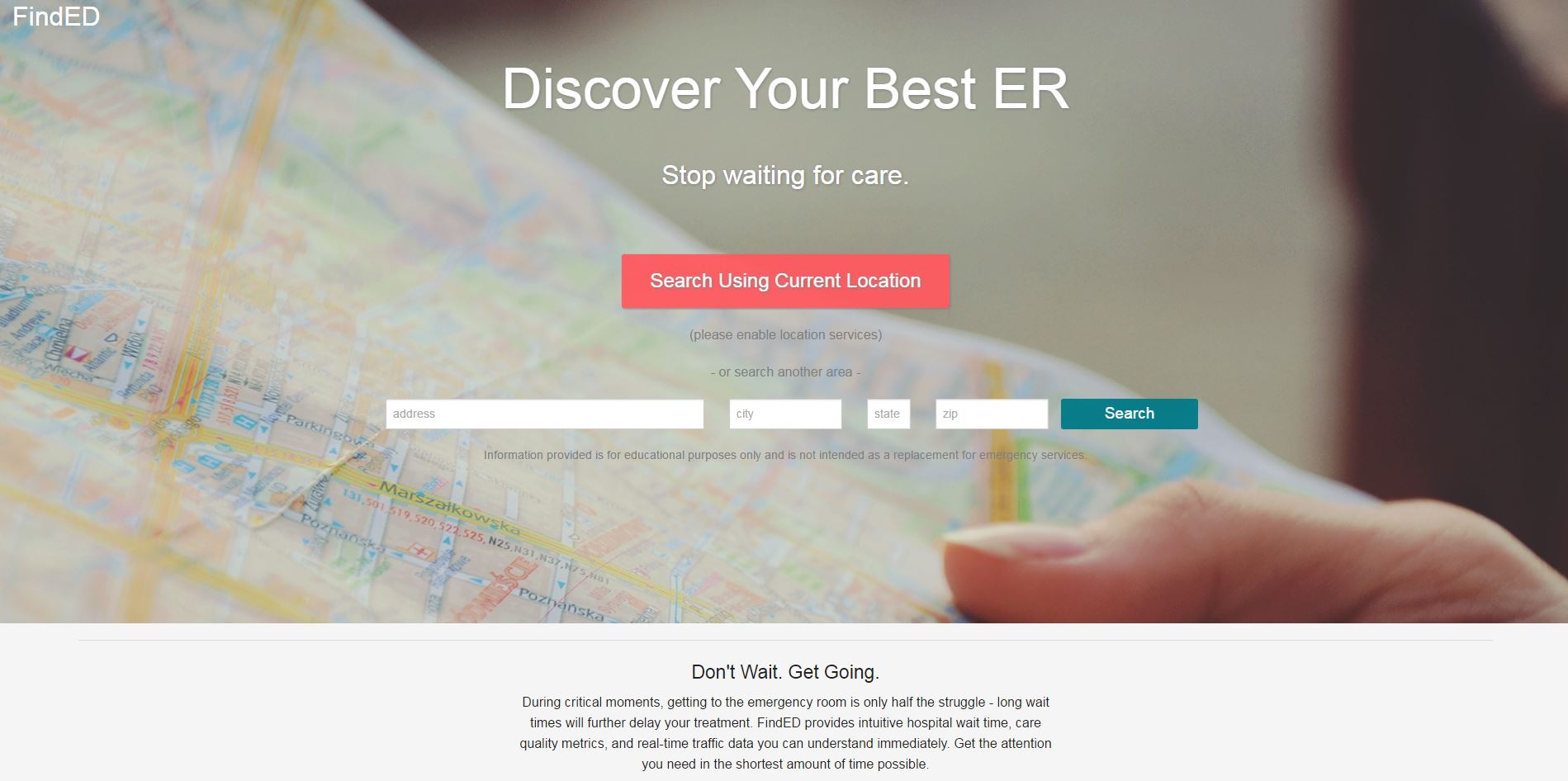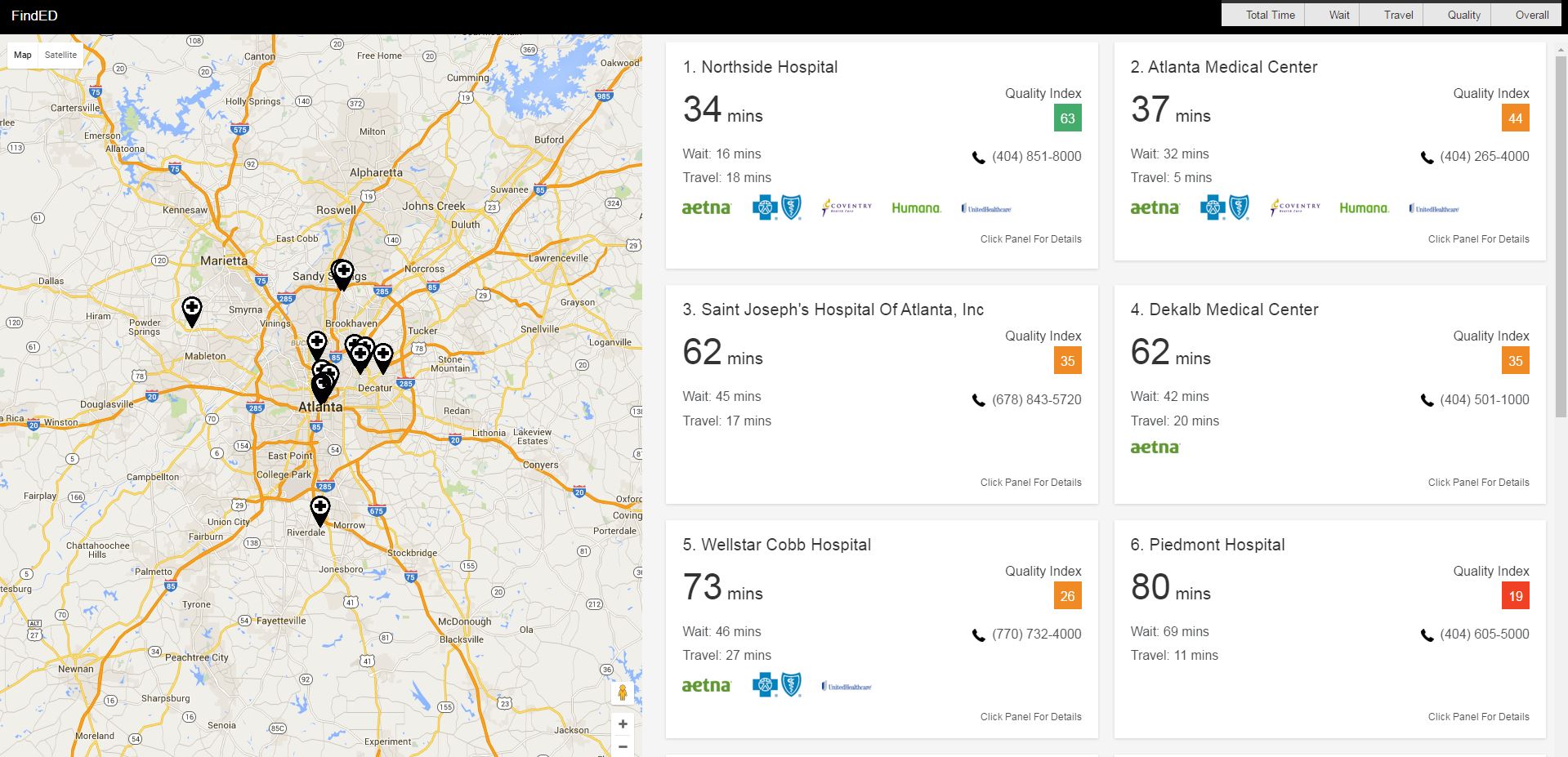Numerous studies have shown that patient demand on hospital emergency departments (ED) have increased exponentially, and that demand is only growing each year. From 2003 to 2009, the average wait time in U.S. EDs between arrival and being seen by a medical professional increased 25 percent, from 46.5 minutes to 58.1 minutes. Prolonged wait times are reported to be a central concern in EDs and are a major reason why patients leave the ED without being seen.
Until recently, there has not been a tool that helps would-be ED users – specifically those who do not arrive via ambulance – determine which nearby hospital has the shortest wait time. Thanks to an interdisciplinary undergraduate team of students from Georgia Tech, the web-based application FindED.io does just that.
When a user goes to the FindED website, she sees a search bar based on the user enabling location services, or else she can enter her location manually. She is then taken to a screen that displays hospitals within a 15-mile radius of her location. Each hospital shows the wait time (based on an annually reported average), the travel time based on real-time information from Google Maps, a quality index average, and – for the state of Georgia – the major insurance providers accepted.
Prashant Tailor (IE 2016), a newly graduated alumnus in the Stewart School of Industrial & Systems Engineering (ISyE) and a member of the FindED team, served for several years as an undergraduate researcher for ISyE professor Eva Lee. (Lee is also Director for the NSF-Whitaker Center for Operations Research in Medicine and Healthcare, Co-Director for the NSF-I/UCRC Center for Health Organization Transformation, and Distinguished Scholar in Health Systems, Health System Institute, Emory University and Georgia Tech.) It was through his research with Lee in support of her research that Tailor came up with the initial idea for FindED.
“I was working at Grady and other hospitals,” Tailor explains, “and I noticed that there was an excessively long wait, especially at Grady. I thought, ‘I can look up wait times for other things online – like food – why can I not do this for a hospital?’”
Tailor emphasizes the importance of the team’s interdisciplinary nature as integral to the success of putting FindED together. In addition to Tailor, the co-founders include Farhan Khan (CS 2016), Dale Rivera (CS 2016), and Tony Shu (MSE & CS 2017). The group knows each other well; the latter three have been friends since high school, and Tailor met them through a mutual friend when they all arrived at Tech together.
“We wanted to leverage the technical skill sets we have to make something people can really use,” he notes. “I would say that it was almost essential to work with an interdisciplinary team, as [FindED] is a very technical product.”
Shu, who is earning a dual degree in MSE and computer science, describes his own experience with FindED: “Working on my first real web design project was intimidating, especially considering how my background up until that point was all in materials. My primary contributions were to the front end of the website. Learning web design from scratch kept me busy for weeks. My biggest takeaway from this project is an understanding of how websites are built and shared.”
Tailor adds, “Working with an MSE, it was good to have a different perspective on the project – how he would approach something versus how I would approach something versus how the two computer science majors would approach something. One [of us] was more design-oriented, so he was always focused on the user experience, and another was focused on making the [site load] as fast as possible. [So the question] was how can we balance these two things?”
For Tailor, it was to look at the big picture. “The IE aspect to me is how can I look at the entire system? How do I use a data set to model a real-life system? That’s pure ISyE.”
He adds, “From the start, I came to Georgia Tech and wanted to get into the complex intersection of ISyE and health care, and Professor Lee has been instrumental in showing me that this area is huge. IE can help improve patient care, patient quality, and delivering health care.”
The team’s hard work paid off with some considerable attention. They put the site up on Reddit one night: “We put it on Reddit just to see what [would] happen,” Tailor says, laughing. “We expected a couple of people to look at it, but then it ended up on the front page. It was very exciting. ” FindED went viral. In the end, the application was beta-tested by over 50,000 Reddit users in a 48-hour period.
In addition, the team took the paper based on their project to a first-place win in the technical paper competition at the 2016 IIE Southeast Regional Conference. Shu presented the paper at the University of South Florida in Tampa. The entire team will travel to Disneyland in Anaheim, CA to present the paper in the Undergraduate Technical Paper Competition Global Finals at the IISE Annual Conference & Expo in late May.
Advisor Eva Lee confirms the significance of the team’s win: “It's an honor for the team to have won this regional competition. The composition of the team showcases the interdisciplinary nature of the work. The key challenges are to ensure that the app is relevant, the information provided is objective and up-to-date, and that patients can choose what matters them the most – how long they have to wait versus quality ranking, or insurance acceptance, etc.
“We have already beta-tested its usability to over 60,000 users. The win definitely motivates broader dissemination.”
Right now, the team is focused on polishing and improving their paper for the global competition. As far as the future for FindED goes, Lee says, “There are other features that I would like the team to investigate; we will continue to improve it as more feedback is received from the provider and consumer ends.”
However, the application was not created with entrepreneurship and profit-generation in mind, according to Tailor. “At its core, it was how we can help people and how we can learn something new.”
For More Information Contact
Shelley Wunder-Smith
Stewart School of Industrial & Systems Engineering
404.385.4745


